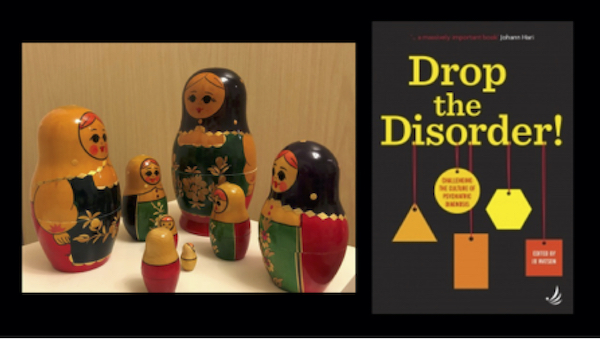It’s Friday 20th September 2019 and I’m sitting in the audience, listening to people speak, at the ‘Drop the Disorder’ book launch event in Birmingham. As the clock ticks nearer to 12.45, the speaker’s voice seems to fade as I begin to notice my heart pounding. I feel clammy, I start to fidget, fiddling with my notes and sipping water from the bottle I’ve already filled up three times that morning. I’m wondering how I’ve made it here today and can’t quite believe that I’m about to stand up, walk to the front and speak to the audience. A little voice in my head says to me, ‘we can do this’; I say back, ‘I hope so’.
I remember the time when, six years ago, after almost two decades of treatment under mental health services, my life didn’t seem worth living and I believed that it was only a matter of time before I would finally succeed in taking my own life – how unreal this all feels!
I suddenly hear Nollaig – the host for the day – announce my name. As I stand up, I take out a handkerchief and breathe in the strong aroma of rosemary oil to help bring me back down to earth. The person I’m sitting next to, my soul sister, the one who has walked alongside me throughout, and the one who shares with me my batshit madness, squeezes my hand. ‘There’s no going back now’ says that little voice.
As I stand at the podium, I’ve entered another zone and I begin to read from my script:
‘I wish I’d come here today to talk about pruning roses or, on a deeper level, to unpick the metaphor of my healing using the image of my younger self nurturing the seed within me – because that would be a whole lot easier for me and a great deal less distressing.
But I haven’t come here for that – I’ve come here as someone who was subjected to sadistic and repeated emotional, physical and sexual childhood abuse.
Abuse that rendered me terrified, trapped and powerless, and with a sense of shame that infected the very essence of my being. Abuse that shattered my sense of self, leaving me feeling so worthless and unlovable that I felt I had to apologise for my very existence. But abuse that I had to keep secret for fear of the devastating consequences should I ever dare to tell; essentially, I was silenced.
I’ve also come here today carrying a legacy of harm that was done to me by the mental health system, having experienced the powerful re-traumatising and silencing effect of that system.A system that claimed expertise in understanding and treating my intense experiences of distress.
And a system I thought I could trust.’
As I only had 15 minutes to speak and because I didn’t want to stumble too much with my words, I then played a short PowerPoint slideshow I’d created, which I hoped would give the audience more of a feel for my story.
After it had played, I spoke again:
‘So, it came as a devastating yet empowering experience for me to discover that I’d been misled. To discover that what I thought was a scientifically reliable and valid field of medicine was actually nothing of the sort.
Even more distressing for me was the wall of silence, the denial and the invalidation that I faced when I began to question those mental health experts who had been involved in my care during my 18-year career as a recipient of their services. They said I had received a gold standard service and told me to thank the psychiatrist for keeping me alive.
Yet in 2013, after almost two decades, I was far sicker both physically and psychologically than I was when I first came into contact with services and my only wish by that time was to leave this world for good. And it’s ironic to think that, whenever I was admitted to a hospital ward, my children were always told that the doctors would make mummy better – I think all three of my children would have something to say about that today.
If someone had said to me in 2013, “Sue, in 2019, you will have been medication-free for six years, you will have liberated yourself from the mental health system and, amongst many other achievements, you might just be a published author”, I think I’d have said, “that’s impossible, you’re talking about a different person”!!
So, I’m still finding it hard to take in that, what felt like the impossible in 2013 has become possible. And although I’m still the same person, it was someone very different who responded and agreed to Jo’s message in November 2017 asking if I’d consider writing a chapter in her forthcoming book about my experiences of attending the “A Disorder for Everyone” events and of being in the “Drop the Disorder” Facebook group.
And I hope my chapter explains how being part of this group has helped me to discover an alternative way of understanding my distress, to find my voice – a voice that had been silenced for far too long – so I can begin to rewrite my story, a story that up until six years ago had been written for me, not by me.
And going back to my wish in 2013 – well, someone very close to me had a very different wish for me. One of my daughters recently told me that every year, when blowing out the candles on her birthday cake, rather than wish for a puppy or a horse, she would wish for mummy to be better. Well, here I am Meg, it’s your 26thbirthday today – I’m a thousand miles from where I was six years ago, and it’s certainly not the doctors who have helped me get here. So, I’m hoping this year you’ll be wishing for that puppy.
I’d like to finish by reading out a poem to you – the only poem I’ve ever written, and I wrote it in the space of about 15 minutes last November, having woken up at 3.00 am with a torrent of words in my head. And that’s probably because, the previous day, I’d been speaking about my experiences under the mental health system and the impact it had had on me.
It’s really a poem in the form of a letter to the mental health system that I reached out to for help, a system that viewed my responses to abuse as symptoms of an illness, a system that then sucked me in, labelled me, medicated me and shocked me.
A system that did me more harm than good.’
Look into my Eyes
When you’re done with noting down the colour of my skin, the style of my hair, my gender, the clothes I’m wearing, the way I sit,
When you’re done with judging the way I express myself, the way I behave,
When you’re done with calculating the risk I pose to you,
When you’re done with depriving me of my freedom,
When you’re done with stripping away my dignity, my humanity, my self-agency,
When you’re done with labelling me and placing me in one of your cluster groups,
When you’re done with plotting out your pathway for me,
When you’re done with subtly insisting on my compliance to your world,
When you’re done with inflicting upon me your evidence-based practices and lecturing me about your NICE guidelines,
When you’re done with questioning the very core of me,
When you’re done with blaming me and shaming me,
When you’re done with crushing my hopes and my dreams,
When you’re done with raping my soul and breaking my spirit,
When you’re done with killing me softly,
When you’re done with all this,
I would ask you,
To show me your humility, your willingness to learn,
To put down your textbooks, your manuals and your formularies,
To set aside your prescription pads,
To peel off the electrodes you’ve placed on my forehead,
To remove your clouded spectacles,
And to step down from your thrones of power,
And when you are ready,
I invite you to be with me in my world,
To walk alongside me as I stumble along my fragile pathway,
To share with me your vulnerability as I have shared with you mine,
To sit with me and bear witness to my hopelessness, my alienation, my pain, my sense of betrayal, my grief and my humiliation,
To look into my eyes,
Where you will see the child within me who holds the agony, the scars, the terror, the silent screams,
And when you have sat for a while with all that you have witnessed,
And are able and willing to hold this space and explore with me my story,
Then my self-loathing, my despair, my loneliness, my shame, my fear begins to fade and wither,
My spirit begins to awaken, and my soul begins to heal.
Only then might you begin to understand who I am.
(Sue Irwin, November 2018)
Footnote: Conversations with my Inner Tribe – Work in Progress
In the two weeks since speaking at the book launch, I’ve had many conversations with my inner tribe. Some have spoken of feeling relieved that their voices have finally been heard, some have expressed how proud they feel, while others have murmured words of fear now that the silence has partly been broken. Many of us are struggling to recognise the Sue who stood at that podium and spoke words that had for many years felt as if they were unspeakable. We felt uncomfortable watching the video of one us reading out our poem and hesitated when asked whether we wanted it to be shared.
There has been one of us whose voice became increasingly louder in the days that followed the event. She kept on asking ‘what about me’, ‘when am I going to be allowed to speak’. When I really listened to this part of me, I realised she was the child I had spoken of in my poem, the one who has held the agony, the scars, the terror, the silent screams. I realised that I had only told half our story, and that the other, perhaps more important half, was just as important and needed to be told just as much. We’re working on that!





Thank you, Sue, for this powerful account of your experiences. It moved me when I heard you at the recent conference in Birmingham, and you words on the page have had a similar impact.
Thank you Gary
Thank you. Your experiences of the appalling psychiatric system are well narrated. I was wondering, have you ever sent your writing to the psychiatrists you have seen over the years? I’d always like to know what psychiatrists would say when a person does recover despite having been told that they will have to live with a diagnosis for the whole of their lives. Do psychiatrists ever admit to being wrong?
Thank you for your comments. I haven’t sent my most recent writings directly to the psychiatrists who were responsible for treating me over the 18 years I was on their caseload. Shortly after I parted company with MH services (around 4.5 years ago), I did send a short reflective piece to the psychiatrist & the MH service involved – the only official response I received was “we are sorry that you found medication unhelpful”.
Hi Sue,
Yes – I’m not surprised by the response except that they actually sent one. When I started analysing my own experiences of how people dealing with mental distress are treated I was really happy to come across Charlotte Perkins Gilman’s ‘Yellow Wallpaper.’ Here is a link: https://en.wikisource.org/wiki/The_Yellow_Wall_Paper
Gilman sent this now seminal work of feminist writing to her former psychiatrist to try to demonstrate the harm his idea of a cure was. She got no response back then and nothing has changed.
You might have already read Gilman’s short story but I thought I’d post it anyway. I found it inspiring and I like to promote it as much as I can to other women who have been treated badly by a psychiatric system that wants to dictate to us what normal behaviour is (i.e. to be in some way like them) and, in so doing, kills so much of what is genuinely beautiful inside people.
Thank you for your reply & the link, I haven’t come across this author before, but will certainly look her up.
Thank you Sue for your powerful and profoundly moving narrative.
Thank you for your comment.